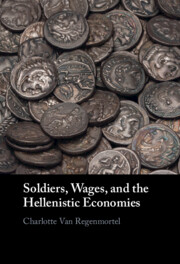Book contents
- Soldiers, Wages, and the Hellenistic Economies
- Soldiers, Wages, and the Hellenistic Economies
- Copyright page
- Dedication
- Contents
- List of Tables
- Acknowledgements
- Note on Transliteration and Translation
- Chronology
- Abbreviations
- List of Maps
- Maps
- Introduction
- Chapter 1 Contextualizing Paid Military Service
- Chapter 2 The Concept of Wage Labour
- Chapter 3 Enlistment and Terms of Service
- Chapter 4 Forms of Remuneration and Standards of Living
- Chapter 5 The Military Labour Market
- Chapter 6 Military Wage Labour and the Hellenistic Economies
- Conclusion
- Epigraphic Dossier
- Bibliography
- Index
Chapter 3 - Enlistment and Terms of Service
Published online by Cambridge University Press: 21 May 2024
- Soldiers, Wages, and the Hellenistic Economies
- Soldiers, Wages, and the Hellenistic Economies
- Copyright page
- Dedication
- Contents
- List of Tables
- Acknowledgements
- Note on Transliteration and Translation
- Chronology
- Abbreviations
- List of Maps
- Maps
- Introduction
- Chapter 1 Contextualizing Paid Military Service
- Chapter 2 The Concept of Wage Labour
- Chapter 3 Enlistment and Terms of Service
- Chapter 4 Forms of Remuneration and Standards of Living
- Chapter 5 The Military Labour Market
- Chapter 6 Military Wage Labour and the Hellenistic Economies
- Conclusion
- Epigraphic Dossier
- Bibliography
- Index
Summary
To ascertain soldiers’ potential status as wage labourers, this chapter discusses the process of initial enlistment and the ensuing terms of service, questioning especially whether soldiers enlisted of their own accord and retained their free status. It emerges that, from the reforms by Philip II of Macedonia onwards, political circumstances dictated a strong drift towards greater and at times complete reliance on so-called voluntary troops, who enlisted in exchange for pay. Thus, while the bulk of troops under Philip and Alexander were conscripts, these armies from the outset encouraged the enlistment of hired, voluntary troops in both elite and ordinary divisions. The lines between different troop types were blurred significantly under Alexander, whose conscript forces re-enlisted as hired men mid-way through his campaign. The Successors, whose often fickle claims to territory complicated the conscription of troops, were almost wholly reliant on voluntary troops. Accordingly, it is at this point that the epigraphic record attests military contracts, in which soldiers’ continued freedom of movement is guaranteed, alongside other terms of service. In the subsequent Hellenistic kingdoms, we see a return to conscription, especially in times of greatest need, alongside an enduring preference for professional, hired soldiers to man the standing armies.
Keywords
- Type
- Chapter
- Information
- Soldiers, Wages, and the Hellenistic Economies , pp. 50 - 100Publisher: Cambridge University PressPrint publication year: 2024

